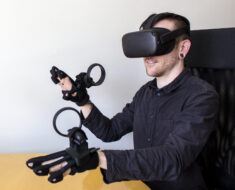
Quantum computing is a rapidly-emerging technology that harnesses the laws of quantum mechanics to solve problems too complex for classical computers. Quantum computers use qubits, which are units of information that can exist in a superposition of two states, such as 0 and 1, at the same time. This allows quantum computers to perform parallel computations and explore multiple possibilities simultaneously, leading to exponential speedups for certain tasks.
One of the most promising applications of quantum computing is in the field of simulation. Quantum computers can simulate the behavior of molecules, atoms, and subatomic particles, which are governed by quantum physics. This could enable breakthroughs in chemistry, biology, medicine, materials science, and nanotechnology. For example, quantum computers could help design new drugs, optimize industrial processes, create novel materials, and discover new phenomena.
Another potential application of quantum computing is in cryptography. Quantum computers could break some of the most widely used encryption schemes that rely on the difficulty of factoring large numbers or finding discrete logarithms. This could pose a threat to the security of online transactions, communications, and data. However, quantum computers could also enable new forms of encryption that are resistant to quantum attacks, such as quantum key distribution and post-quantum cryptography.
Quantum computing is based on the theoretical physics of quantum mechanics, which describes the nature and behavior of matter and energy at the smallest scales. Some of the key concepts that underlie quantum computing are:
– Superposition: A qubit can exist in a linear combination of two basis states, such as |0> and |1>, until it is measured. The probability of measuring each state depends on the amplitude of the superposition.
– Entanglement: Two or more qubits can share a quantum state and influence each other, even when they are physically separated. This creates correlations that cannot be explained by classical physics.
– Interference: The amplitudes of superposed states can interfere constructively or destructively, depending on their relative phases. This can be used to amplify or cancel out certain outcomes.
– Measurement: Observing a qubit collapses its superposition into one definite state, according to the Born rule. The act of measurement also affects the state of entangled qubits.
Quantum computing is a multidisciplinary field that involves researchers from physics, computer science, mathematics, engineering, and other domains. Some of the pioneers and leaders in quantum computing are:
– Richard Feynman: A Nobel laureate physicist who proposed the idea of using quantum systems to simulate quantum phenomena in 1982.
– Peter Shor: A mathematician who developed an algorithm for factoring large numbers using a quantum computer in 1994.
– David Deutsch: A physicist who formulated the concept of a universal quantum computer and devised the first quantum algorithm in 1985.
– John Preskill: A physicist who coined the term “quantum supremacy” to describe the point when a quantum computer can outperform a classical computer on a specific task.
– Rainer Blatt: A physicist who demonstrated the first scalable ion trap quantum computer with 14 qubits in 2011.
– Michelle Simmons: A physicist who leads a team that builds silicon-based quantum computers using atomic-scale fabrication techniques.
– Arvind Krishna: The CEO of IBM, which offers cloud-based access to its quantum hardware and software platforms.
– Sundar Pichai: The CEO of Google, which claimed to achieve quantum supremacy with its 53-qubit Sycamore processor in 2019.
Quantum computing is still in its infancy and faces many challenges, such as noise, decoherence, error correction, scalability, and algorithm design. However, it also holds immense potential for advancing science and innovation in the future. Quantum computing is not only a fascinating topic to explore but also a valuable skill to learn for anyone interested in technology.
Dil Bole Oberoi





